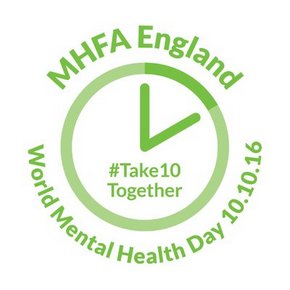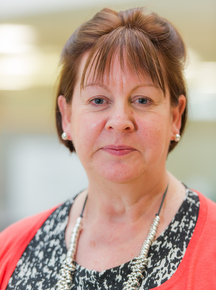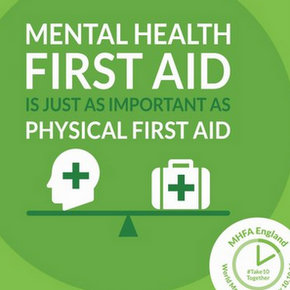
10% of suicides in construction industry: how do we improve mental health care?
GUEST BLOG
 Tricia O’Neill, Head of Occupational Health and Wellbeing at Skanska
Tricia O’Neill, Head of Occupational Health and Wellbeing at Skanska
With World Mental Health Day approaching, Skanska outline practical action that can improve the well being of construction industry workers and reduce the high suicide rate, with statistics showing that ten per cent of all suicides in the UK happen within the sector and workers 6 times more likely to die from suicide than from a fall from height.
While all workplaces must have a physical first aider, looking after employee mental health at work is becoming an increasing priority. Mental health issues such as stress, depression or anxiety account for people taking almost 70 million days off sick per year – the most of any health condition – costing the UK economy between £70 billion and £100 billion a year.[1]
Mental ill health in the workplace is a growing issue with one in six working age adults experiencing depression, anxiety or stress-related issues at any one time.[2] With World Mental Health Day on 10th October, Mental Health First Aid (MHFA) England is calling on employers to find out how they can support the mental wellbeing of their staff.
At Skanska we place a strong emphasis on creating the right working culture where our employees feel valued, able to contribute and reach their potential.
The effect of mental health issues in the construction industry is well-documented with statistics showing that ten per cent of all suicides in the UK happen within the sector.
In February 2016, we were one of the first construction companies to sign the ‘Time to Change’ pledge – in association with mental health charities Mind and Rethink Mental Illness.
Mental Health First Aid
 Our Executive Vice President, Greg Craig has been inspired to act by his personal experience of the impact mental health issues can have, and signed the pledge on behalf of Skanska. This marked the start of our campaign to raise awareness of mental health issues and to remove the stigma and discrimination attached to it.
Our Executive Vice President, Greg Craig has been inspired to act by his personal experience of the impact mental health issues can have, and signed the pledge on behalf of Skanska. This marked the start of our campaign to raise awareness of mental health issues and to remove the stigma and discrimination attached to it.
Mental health isn’t something we can see but it affects one in four people in the UK, every year. That’s a significant statistic when you consider the size of our workforce.
Since signing the pledge, we have been working hard to deliver on our commitment to not only put the right support in place, but to develop a culture of understanding to change the perception of mental health.
Underpinning our commitment, we have also started to train ambassadors in Mental Health First Aid (MHFA). Within this training course, ambassadors are taught to spot the signs of stress and anxiety and to offer support and guidance towards a range of wellbeing facilities offered by Skanska.
Through the ambassador programme we can offer a visible line of support to employees who might be suffering in silence and reduce the stigma that is attached to mental health. We also offer an employee assistance programme run by UK provider Health Assured, which provides around-the-clock support and counselling.
Since February, we have already trained 96 employees in MHFA, with a commitment to have trained over 200 by the end of the year. Many of the ambassadors have personal experience of mental health issues. My vision is to build up the mental health ambassador network to cover all sites at Skanska and ensure resources are available to everyone no matter where they work.
As well as the ambassador programme, Skanska is involved in national mental health initiatives, including Mental Health Awareness Week and Mental Health Foundation ‘Tea and Talk’ events. It also held a Stand Up, where the whole company – across all sites – spent time discussing mental health issues.
The aim of these events is to keep up the momentum around removing discrimination attached to mental health issues – one conversation at a time – and to raise awareness of the support available at Skanska.
What the future holds
We are hosting workshops to raise awareness around best practice to support anyone who may be experiencing an issue relating to their mental health and are planning to hold a conference with supply chain employer, clients and employees to raise awareness and share mental health best practice
We’ve made some great steps in the last few months in trying to change the culture and attitude around mental health. We want everyone who works here to feel they can truly be themselves and ask for support if they need it.
Greg Craig, Executive Vice President at Skanska comments on the future for mental health within the industry: “We are uniting with other industry leaders to launch the first UK-wide programme to promote positive mental health across the construction industry; through Mates in Mind.
“Mates in Mind is a sector-wide programme intended to help raise awareness and understanding of mental health issues. It has the support of the British Safety Council and is being developed by the Health in Construction Leadership Group (established 18 months ago by Skanska and other representatives from the industry). The objective is to help employers address the issue of mental ill health in a way that is consistent and to make it available to all workers across the sector.
By uniting the industry on this important initiative, we believe we have an opportunity to build a much greater understanding around mental health and make a real difference to the lives of the people that work in our challenging environment.”
For more guidance around how to approach and respond to a colleague who is experiencing a mental health issue download the free Line Managers Resource at mhfaengland.org/workplace/line-managers-resource/
To find out how employers can support the wellbeing of their staff and demonstrate their commitment to World Mental Health Day, visit mhfaengland.org and download the free MHFA England Take 10 Together toolkit. MHFA England is calling on all employers to Take 10 Together and encourage everyone to have a 10-minute conversation with a friend, family member or colleague about their mental health. Join in the conversation on twitter @MHFAEngland #Take10Together #WMHD16
……………………
[1] Davies SC. Annual Report of the Chief Medical Officer 2013, Public Mental Health Priorities: Investing in the Evidence. Department of Health. 2014. Available at: https://www.gov.uk/government/uploads/system/uploads/attachment_data/file/413196/CMO_web_doc.pdf, p.158
[2] ONS (2009)
[3] Suicide in the construction industry: Report by Deakin University for MATES in Construction
One comment on “10% of suicides in construction industry: how do we improve mental health care?”
Leave a Reply
You must be logged in to post a comment.
Latest news

26th July 2024
Enfield Speciality Doors completes world-class project for Atlas Copco HQ
A rundown office and warehouse building completely transformed into a modern headquarters for Atlas Copco has been fitted with more than 120 internal fire doors from Enfield Speciality Doors.
Posted in Access Control & Door Entry Systems, Articles, Building Industry News, Building Products & Structures, Building Systems, Case Studies, Doors, Interior Design & Construction, Interiors, Posts, Restoration & Refurbishment, Retrofit & Renovation, Security and Fire Protection, Sustainability & Energy Efficiency, Timber Buildings and Timber Products, Wooden products
26th July 2024
Abloy UK launches new white paper
Abloy UK, a leading provider of security and access control solutions, has launched a new white paper.
Posted in Access Control & Door Entry Systems, Architectural Ironmongery, Articles, Building Industry News, Building Products & Structures, Building Services, Doors, Facility Management & Building Services, Health & Safety, Information Technology, Innovations & New Products, Publications, Research & Materials Testing, Security and Fire Protection
26th July 2024
MCRMA Member Profile: David Roy, Director of Roofconsult
David Roy of MCRMA member company Roofconsult has more than 50 years’ experience to draw upon working in the building envelope sector and a unique perspective on how it has changed in that time.
Posted in Articles, BIM, Infrastructure & CAD Software, Building Associations & Institutes, Building Industry News, Building Products & Structures, Building Services, Building Systems, Cladding, Information Technology, Restoration & Refurbishment, Retrofit & Renovation, Roofs, Walls
26th July 2024
Strand: Enhancing Door Functionality and Safety
Craig Fox, Sales Director for Strand Hardware, outlines how door industry professionals might apply door limiting stays…
Posted in Architectural Ironmongery, Articles, Building Industry News, Building Products & Structures, Building Services, Doors, Facility Management & Building Services, Health & Safety, Restoration & Refurbishment, Retrofit & Renovation

Comment from Clive Johnson, Group Head of Health in Construction Leadership Group at Land Securities and chairs the Health in Construction Leadership Group: “We want the industry to look after their workforce and to see talking about things, as a strength rather than a weakness, and to stamp out the ‘it’s not happening to me’ mentality.”